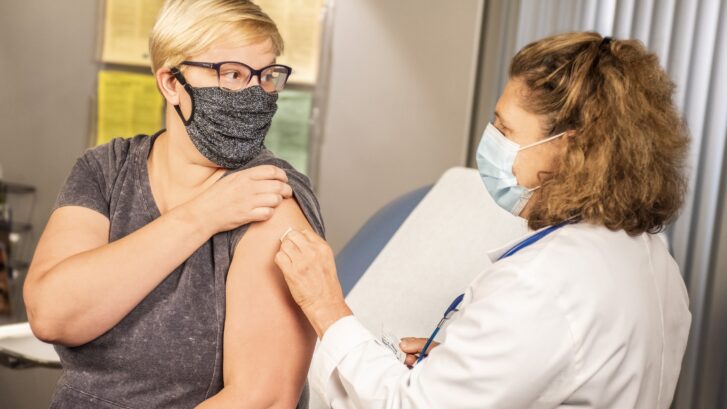Conquering Needle Phobia to Save Your Life
You don’t believe any of the misinformation you’ve been seeing online about the coronavirus vaccines. You really want protection from its deadly effects. But, as more vaccines become available, you’re dragging your feet in making an appointment due to a needle phobia.
Because no matter how many times you’ve seen the endless videos of people getting their shots, you still get a sick feeling in the pit of your stomach every time. Maybe you’ve even signed off social media and refused to watch television news because they won’t stop showing people getting jabbed.
Our Jupiter, Florida, concierge primary care doctors understand what you’re going through. We see a lot of this from our patients. Even before the rollout of the coronavirus vaccines, some of our patients have always had a difficult time getting shots or having their blood drawn.
A common phobia
It’s not funny, and it’s not a sign of weakness. It’s common in all ages, with men as well as women.
“Just by me injecting a needle into one of my patients—this was a grown adult man—he passed out,” Dr. John Morrison, a primary care provider with Advent Health Wesley Chapel in Tampa, told WTSP-10. “And I probably see that once every couple of months in a grown adult.”
The American Psychiatric Association’s Diagnostics and Statistical Manual of Mental Health Disorders (DSM-5) recognized it in 1994. It’s called “trypanophobia,” or the fear of injections. And this deep-seated type of phobia is not something anyone can talk you out of.
Considered one of the top 10 fears, fear of needles affects an estimated 50 million Americans. And it can cause people to avoid necessary medical attention. In the case of the coronavirus vaccine, it could cost you your life.
According to Psychology Today, “Needle phobia is real . . . and the symptoms can make getting a shot extremely uncomfortable. These range from mild to severe and can include dizziness, fainting, anxiety, insomnia, panic attacks, increased blood pressure, fast heart rate, and avoidance. Just the thought of getting a shot can bring on symptoms in some people.”
A fourth-year medical student at Thomas Jefferson University in Philadelphia, Pennsylvania, Amanda Walker regularly gives injections and inserts IV needles in patients. But she recently told CNN she has a needle phobia of her own.
“I’ll start to get really clammy, and then get cold sweats,” she said, describing her reactions to injections she gets herself. “Then I pass out.” Nevertheless, she intends to become a pediatrician, and says her own phobia will help when she’s dealing with her younger patients.
What doesn’t help needle phobia
It’s critical that as many people as possible receive the coronavirus vaccine. Not only will it protect themselves, but also to protect the population as a whole as well as to stop the rampant virus mutations.
But for those who have a needle phobia, whether it’s mild or severe, ridicule and scorn don’t help. Telling people to “put on your big-boy/girl pants and deal with it” is condescending, uninformed, and unhelpful.
Avoidance is also not helpful, however, either for reining in the pandemic or for one’s overall physical or mental health.
“I tell all my patients with any kind of anxiety that avoidance is actually fuel for anxiety,” Kristin Kunkle, a psychologist at the Washington Anxiety Center of Capitol Hill in D.C., told The Washington Post. “The more you avoid something, the worse it gets.”
What does help needle phobia
Here are some strategies that can help you cope with getting the vaccine.
- For several days before your appointment, practice relaxation exercises: deep breathing, progressive muscle relaxation, or mindfulness training. Then use these when the time comes.
- Let the person giving the shot know that you have a problem. It won’t be the first time they’ve heard it, and they have ways to help.
- Bring along a distraction: a friend, an engrossing book, or some engaging phone apps. And avoid looking at the needle. Instead, focus intently on something else in the room.
- For a severe phobia, you may need longer-term therapy such as cognitive behavioral therapy (CBT), which involves gradual desensitization.
Here’s a little argument you can have with yourself that might help: Would you rather have one shot to prevent COVID-19 or a whole lot of shots, IV needles, and blood draws if you end up hospitalized with the illness?
If you have a fear of needles, or any hesitation at all about receiving the coronavirus vaccine, please let us know. We can provide anti-anxiety medication if necessary, or a skin-numbing cream or pain-blocking gels. The important thing is to get the vaccine as soon as you can get an appointment.

